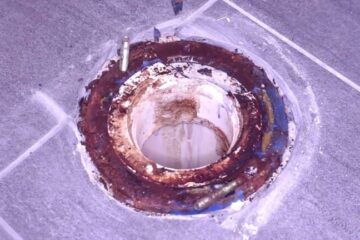Maintaining the cleanliness and lustrous appearance of your granite sink is essential to prolong its lifespan and preserve its natural beauty. In this comprehensive guide, you will explore various effective methods and techniques to clean your granite sink, ensuring that it remains pristine and free from stains, dirt, and grime. From gentle cleaning agents to smart cleaning strategies, this article provides you with the ultimate solutions to keep your granite sink looking immaculate and impeccable.
Preparation
Before you start cleaning your granite sink, it’s important to gather all the necessary materials. You will need mild dish soap, baking soda, white vinegar, a non-abrasive sponge, a soft cloth, plastic wrap, a granite sealer, a microfiber cloth, a granite repair kit, and a granite polish. These materials will help you effectively clean and maintain the shine of your granite sink.
In addition to gathering materials, it is essential to clear out the sink before starting the cleaning process. Remove any dishes, utensils, or food particles from the sink, and ensure that it is empty. This will make it easier to clean the sink thoroughly and prevent any debris from interfering with the cleaning process.
Another important step in preparing to clean your granite sink is to protect the surrounding areas. Granite is a durable material, but it can still be susceptible to damage from harsh chemicals or abrasive cleaners. To avoid any accidental spills or damage to your countertops or cabinets, place a protective mat or towel around the sink area. This simple precautionary measure will give you peace of mind while cleaning your granite sink.
Daily Cleaning
To keep your granite sink looking clean and fresh on a daily basis, it is essential to follow a simple cleaning routine. After each use, rinse the sink thoroughly with warm water. This will help remove any loose debris, food particles, or residue from the sink’s surface.
Once the sink is rinsed, take a soft cloth or sponge and wipe down the entire sink, paying special attention to any areas that may have come into contact with soap or other substances. Mild dish soap can be used to remove stubborn stains or grease. Avoid using abrasive cleaners, as they can scratch the surface of your granite sink and dull its shine over time.
Removing Stains
If your granite sink has stains that need to be removed, it is important to identify the type of stain before proceeding with the cleaning process. Common types of stains include food stains, oil or grease stains, and hard water stains.
To remove stains from your granite sink, create a paste with baking soda and a small amount of water. Apply the paste to the stained area, making sure to cover it completely. Place plastic wrap over the paste and leave it overnight. The baking soda will work to absorb the stain and help lift it from the surface of the sink.
In the morning, gently scrub the stained area with a non-abrasive sponge or cloth. Rinse the sink thoroughly with warm water to remove any residue. It may be necessary to repeat this process for stubborn stains.
Removing Mineral Deposits
Over time, mineral deposits from hard water can build up in your granite sink, leaving unsightly spots or stains. To remove these deposits and restore the shine of your sink, mix equal parts water and white vinegar in a bowl or spray bottle.
Soak a cloth in the vinegar and water solution and place it over the mineral deposits. Let it sit for approximately 30 minutes to allow the vinegar to dissolve the mineral deposits. Afterward, gently scrub the deposits using a non-abrasive sponge or cloth. Rinse the sink thoroughly to remove any remaining residue or vinegar smell.
Dealing with Grease and Oil
Grease and oil stains can be a common issue in kitchen sinks, especially granite sinks. To effectively remove grease and oil from your granite sink, use a gentle degreasing agent. You can purchase a specific granite-safe cleaner or use a mild dish soap mixed with warm water.
Apply the cleaner or soap mixture to the greasy or oily areas of the sink and let it sit for a few minutes. This will allow the cleaning solution to break down the grease and oil. Afterward, wipe the sink with a soft cloth or sponge, making sure to remove all traces of the cleaning solution. Finally, rinse the sink thoroughly with warm water to ensure it is free from any residue.
Preventing Scratches
To prevent scratches on your granite sink, it is important to take proper precautions during daily use and cleaning. Avoid using harsh scrub brushes or abrasive cleaners, as these can scratch the surface of your sink.
Instead, opt for non-abrasive cleaners or mild dish soap mixed with warm water. These will effectively clean your granite sink without causing any damage. Additionally, using a protective mat or towel in the sink can provide a barrier between dishes, utensils, or pots and the sink’s surface, reducing the risk of scratches.
When preparing food or using sharp utensils, always use cutting boards and trivets. This will not only protect your granite sink from scratches but also ensure the longevity of your cutting boards and prevent cross-contamination of food.
Maintaining Shine
To maintain the shine of your granite sink, it is important to regularly clean it with mild soap and water. After each cleaning, make sure to dry the sink thoroughly with a soft cloth. This will prevent water spots or streaks from forming on the surface of the sink.
To further enhance the shine and protect the surface of your granite sink, apply a granite sealer. Follow the manufacturer’s instructions for application and allow the sealer to dry completely. Once dry, use a microfiber cloth to buff the sink gently. This will leave your granite sink looking clean, shiny, and well-maintained.
Avoiding Harsh Chemicals
When cleaning your granite sink, it is important to avoid using harsh chemicals that can damage the surface. Acidic or abrasive cleaners should never be used on granite, as they can cause etching or scratches. Additionally, ammonia-based products should be avoided, as they can dull the shine of your sink.
Instead, opt for pH-neutral cleaners that are specifically designed for use on granite or other natural stone surfaces. These cleaners are gentle yet effective in removing dirt, stains, and residue from your granite sink without causing any harm.
Dealing with Hard Water Spots
Hard water spots can be unsightly on your granite sink, but they are relatively easy to remove. Create a mixture of equal parts water and vinegar in a spray bottle. Spray the solution onto the spots and let it sit for a few minutes to allow the vinegar to dissolve the mineral deposits causing the spots.
After the vinegar solution has had a chance to work, wipe the spots with a soft cloth or sponge. The combination of vinegar and gentle scrubbing should help remove the hard water spots. Rinse the sink thoroughly to ensure all residue is removed and enjoy the restored shine of your granite sink.
Treating Scratches
If your granite sink has developed scratches, there are steps you can take to restore its appearance. Start by assessing the severity of the scratch. Minor scratches can often be treated with a granite repair kit, which typically includes all the necessary materials and instructions for repairing scratches.
Follow the instructions provided with the repair kit to apply the appropriate product to the scratched area. Gently buff the area using a soft cloth or sponge, following the instructions for the repair kit. Once the scratch is repaired, finish the process by polishing the area with a granite polish. This will help blend the repaired area with the rest of the sink and restore its shine.
In conclusion, cleaning and maintaining a granite sink is a simple yet important task for keeping it looking pristine and extending its lifespan. By following the steps outlined in this comprehensive guide, you can effectively remove stains, mineral deposits, and grease from your granite sink. Additionally, taking preventative measures and using the right cleaning products can help prevent scratches, maintain the shine, and avoid damage to your sink. With regular cleaning and proper care, your granite sink will continue to be a beautiful and functional centerpiece in your kitchen.



